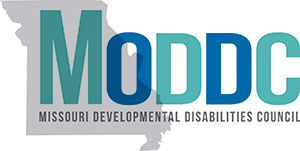Missouri Developmental Disabilities Council's Position Outreach
The Division of Developmental Disabilities (DDD) is a state agency in Missouri. The DDD gives services for Missourians with intellectual and developmental disabilities (I/DD). But, tens of thousands of people with I/DD can’t get help from the DDD. Many of them could get help but don’t know it.
There are many other ways people with I/DD can get help though. There are different services and supports in Missouri, locally, and for the whole U.S. These supports help people with disabilities live in the communities they want. They help them live on their own. They help them live full and healthy lives. These supports help people make their own choices.
People with I/DD and their families need to know about what kinds of help they can get. Missouri needs to figure out how to get people the information they need. They need to reach out to people with disabilities and let them know. This is called outreach.
Why is this important?
1.4 million adult Missourians have a disability. Almost 300,000 Missourians have a cognitive disability that makes it hard to live alone. A cognitive disability is a disability that makes it harder to think, plan, or remember things.
People with I/DD have different health needs than people without disabilities. They need more health care and extra help living on their own. One study found 34,000 people got help from the DDD. But tens of thousands of people who need help can’t get it from DDD. This makes it harder for them to be healthy and live the lives they want.
Some of the reasons people aren’t getting the help they need are:
- Wait lists
- Rules that limit who can get what kinds of help
- Not knowing that they can get help
But there are many groups throughout Missouri besides DDD that can help people. For example, Centers for Independent Living can help people live on their own. They can also help people be a part of their community.
Outreach
The MODESE Vocational Rehabilitation program has services to help people get and keep jobs.
Some of these services are:
- Medical care
- Mental health care
- Help with understanding life choices and making decisions (counseling)
- Help finding more support and services (assessments)
Missouri also has County Boards for Developmental Disabilities. These groups can provide case management and other services.
Finally, people with disabilities can get help from people who are already in their lives. These people can be friends, family, or other people in their communities. With the right training, these people can help support their loved ones with disabilities. This is one more way to help people with disabilities lead the lives they want.
What should Missouri do?
People with disabilities have the right to live independently in the community they choose. They deserve full, healthy lives. Missouri should make sure people with disabilities get the supports and services they need.
Sometimes, Missouri will need to tell people with disabilities about important things. When this happens, Missouri should reach out in a way that is accessible. This means thinking about people’s needs, like:
- The language they speak
- If they have and can use technology
- Their culture
Missouri needs to follow disability laws when reaching out to people with disabilities. These laws make sure Missouri communicates with people in accessible ways. Some of these laws are:
- The Americans with Disabilities Act
- Section 508,10 Title VI of the Civil Rights Act of 1964
- The Missouri Information Technology Accessibility Standards
People with disabilities can get help from the people they already know. Those people could be friends, families, or members of their community. Missouri should let people know how they can support people with disabilities. Missouri should let people with disabilities know how they can ask others for help.
People with I/DD deserve to live in and be a part of the community. They deserve to live on their own and make their own choices. They deserve full and healthy lives. A good transition plan helps people meet these goals. Schools and groups that give services should work together to help people with their transition plans.
When disabled people get services, they should be able to work with peer mentors. A peer mentor is a person with disabilities who knows about how services work. Their job is to help other people with disabilities to get services. Missouri groups that give services to people with disabilities should use peer mentors.
There are many groups that can help people with disabilities get supports and services. Missouri should tell people with disabilities and their families about them. People who work at these groups should know what help other groups can give.
- Example: Iris goes to DDD for help finding a place to live. She talks to a case manager there named Carl. Carl tells Iris that the DDD can’t help her with housing at this time. But, Carl was trained about what other groups can help Iris with housing. Carl tells Iris about which groups can give her the help she needs.

